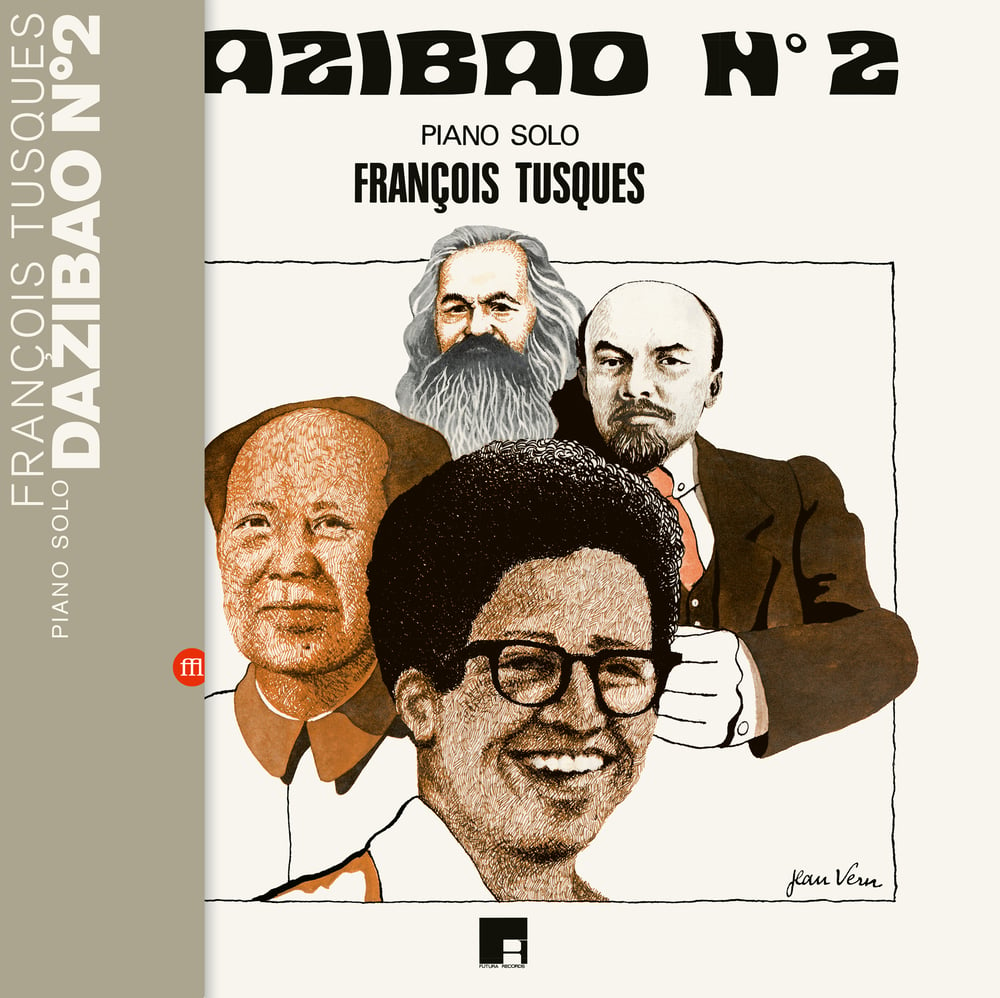François Tusques - Dazibao n°2 (FFL074)
23,00 €
First ever LP reissue
Carefully remastered from the master tapes
Heavyweight 180 gr. LP
425 gsm brownboard outer sleeve
Licensed from Futura / Marge
This was of course not the first time that François Tusques was a ‘headline act’. In 1965, he recorded, with other like-minded Frenchmen (François Jeanneau, Michel Portal, Bernard Vitet, Beb Guérin and Charles Saudrais), the first album of free jazz in France, named… Free Jazz. In 1967, Tusques again served up Le Nouveau Jazz, in the company of Barney Wilen (and Beb Guérin, Jean-François Jenny-Clark, and Aldo Romano).
Three years later, between May and September 1970, the pianist recorded, at his home, Piano Dazibao, an album on which he multiplied joyful escapades as a critical iconoclast. The following year Tusques recorded Dazibao N°2, which shows him as an incisive commentator of his times
Following in the footsteps of Don Cherry, who he had met a few years earlier in Paris, Tusques made a plea for “friendship between all the peoples of the world” to the sound of Universalist hymns which transported us from Africa to Asia. But it is really a song to America, evoking the assassination of the activist George Jackson and the mutiny in Attica prison, before covering “Seize the Time” by Elaine Brown – three years after the release of Dazibao N°2, she became the first (and only) woman to lead the Black Panther Party.
The turmoil of Piano Dazibao, was opposed, on Dazibao N°2, by long, labyrinthine tracks with alternating discords and repetitions. Often using prepared piano, Tusques was more percussive (even heady) than ever, exposing a melody with solid hammer strikes or painting an image which radiated peace in spite of the storms. Piano Dazibao and Dazibao N°2 thus form the two sides of one coin, which displays the effigy of François Tusques, an international national monument!
*
Ce n’est bien sûr pas la première fois que François Tusques est « à l’affiche ». En 1965, il enregistre avec d’autres frenchies remontés (François Jeanneau, Michel Portal, Bernard Vitet, Beb Guérin et Charles Saudrais) le premier disque de free « made in France » : Free Jazz. En 1967, il sert Le Nouveau Jazz en compagnie de Barney Wilen (et de Beb Guérin, Jean-François Jenny-Clark et Aldo Romano).
Trois ans plus tard, entre mai et septembre 1970, le pianiste enregistre de chez lui Piano Dazibao, album sur lequel il multiplie les frasques jubilatoires en iconoclaste vindicatif. L’année suivante, Tusques signe Dazibao N°2, qui le montre en incisif chroniqueur de son époque.
Dans les pas de Don Cherry, rencontré quelques années plus tôt à Paris, Tusques plaide pour « l’amitié des peuples du monde entier » au son d’hymnes universalistes qui le transportent d’Afrique en Asie. Mais c’est l’Amérique qu’il chante, évoquant l’assassinat de l’activiste George Jackson et la mutinerie de la prison d’Attica, avant de reprendre « Seize the Time » d’Elaine Brown – trois ans après la sortie de Dazibao N°2, la jeune femme deviendra la première femme à prendre la tête du Black Panther Party ; elle sera d’ailleurs la seule.
Au grand chambardement de Piano Dazibao, Dazibao N°2 oppose de longues pièces labyrinthiques que se disputent les répétitions et les dissonances. Souvent sur piano préparé, Tusques s’y fait plus percussif (voire entêtant) que jamais, mettant au jour une mélodie à coups de marteaux bien frappés ou peignant une impression de paix, qui irradie malgré les tempêtes. Piano Dazibao et Dazibao N°2 sont ainsi les deux faces d’une même pièce qui porte l’effigie de François Tusques, international monument national.
.33rpm.
©2022 SouffleContinu Records
-
If you want registered shipping,
please contact us at:
[email protected]
We can’t guarantee delivery or refund without registered shipping. Sorry about that.


